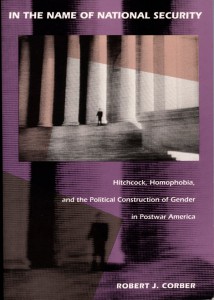In the Name of National Security
Hitchcock, Homophobia, and the Political Construction of Gender in Postwar America


Average rating: ![]()
| 0 | rating | |
| 0 | rating | |
| 0 | rating | |
| 0 | rating |
Your rating: -
Book Presentation:
In the Name of National Security exposes the ways in which the films of Alfred Hitchcock, in conjunction with liberal intellectuals and political figures of the 1950s, fostered homophobia so as to politicize issues of gender in the United States.
As Corber shows, throughout the 1950s a cast of mind known as the Cold War consensus prevailed in the United States. Promoted by Cold War liberals--that is, liberals who wanted to perserve the legacies of the New Deal but also wished to separate liberalism from a Communist-dominated cultural politics--this consensus was grounded in the perceived threat that Communists, lesbians, and homosexuals posed to national security. Through an analysis of the films of Alfred Hitchcock, combined with new research on the historical context in which these films were produced, Corber shows how Cold War liberals tried to contain the increasing heterogeneity of American society by linking questions of gender and sexual identity directly to issues of national security, a strategic move that the films of Hitchcock both legitimated and at times undermined. Drawing on psychoanalytic and Marxist theory, Corber looks at such films as Rear Window, Strangers on a Train, and Psycho to show how Hitchcock manipulated viewers' attachments and identifications to foster and reinforce the relationship between homophobia and national security issues.
A revisionary account of Hitchcock's major works, In the Name of National Security is also of great interest for what it reveals about the construction of political "reality" in American history.
Press Reviews:
"Corber's argument is at once clear and rich. He makes clear that Hitchcock's films engage fundamental issues of sexuality and gender identity, and he also makes clear that these issues are in dialogue with the process of ideological struggle, including the mobilization of homophobia, in which Cold War Liberalism won its powerful place in the 1950s. The richness comes in the contexts Corber provides from that struggle and in the lucid imagination with which he reconceptualizes very famous films in relation to those contexts." - Jonathan Arac
See the publisher website: Duke University Press
See the complete filmography of Alfred Hitchcock on the website: IMDB ...
> From the same author:
> On a related topic:
Hitchcock and Herrmann (2026)
The Friendship and Film Scores that Changed Cinema
Subject: Director > Alfred Hitchcock
One Shot Hitchcock (2024)
A Contemporary Approach to the Screen
Dir. Luke Robinson and Melanie Robson
Subject: Director > Alfred Hitchcock
Alfred Hitchcock All the Films (2024)
The Story Behind Every Movie, Episode, and Short
by Bernard Benoliel, Gilles Esposito, Murielle Joudet and Jean-François Rauger
Subject: Director > Alfred Hitchcock
Alfred Hitchcock and Film Noir (2024)
The Darker Side
Dir. R. Barton Palmer and Homer B. Pettey
Subject: Director > Alfred Hitchcock
Hitchcock's Blondes (2023)
The Unforgettable Women Behind the Legendary Director's Dark Obsession
Subject: Director > Alfred Hitchcock
Cultural Theory in the Films of Alfred Hitchcock (2023)
Subject: Director > Alfred Hitchcock